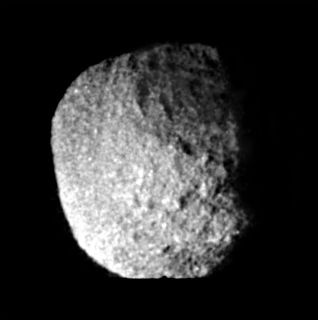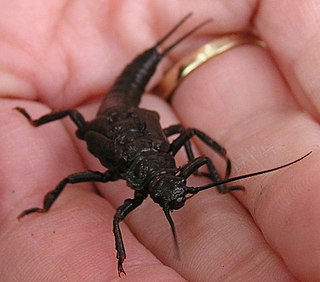
In Greek mythology, Proteus is an early prophetic sea-god or god of rivers and oceanic bodies of water, one of several deities whom Homer calls the "Old Man of the Sea" (halios gerôn). Some who ascribe a specific domain to Proteus call him the god of "elusive sea change", which suggests the constantly changing nature of the sea or the liquid quality of water. He can foretell the future, but, in a mytheme familiar to several cultures, will change his shape to avoid doing so; he answers only to those who are capable of capturing him. From this feature of Proteus comes the adjective protean, meaning "versatile", "mutable", or "capable of assuming many forms". "Protean" has positive connotations of flexibility, versatility and adaptability.

Proteus, also known as Neptune VIII, is the second-largest Neptunian moon, and Neptune's largest inner satellite. Discovered by Voyager 2 spacecraft in 1989, it is named after Proteus, the shape-changing sea god of Greek mythology. Proteus orbits Neptune in a nearly equatorial orbit at the distance of about 4.75 times the radius of Neptune's equator.

Sinbad: Legend of the Seven Seas is a 2003 American animated adventure film produced by DreamWorks Animation and distributed by DreamWorks Pictures. The film uses traditional animation with some computer animation. It was directed by Tim Johnson and Patrick Gilmore and written by John Logan, and stars the voices of Brad Pitt, Catherine Zeta-Jones, Michelle Pfeiffer, and Joseph Fiennes. The film covers the story of Sinbad, a pirate who travels the sea with his dog and his loyal friend Marina to recover the lost Book of Peace from Eris to save his childhood friend, Prince Proteus, from accepting Sinbad's death sentence. The film blends elements from the 1001 Arabian Nights and classical myths.

Proteus vulgaris is a rod-shaped, nitrate-reducing, indole-positive and catalase-positive, hydrogen sulfide-producing, Gram-negative bacterium that inhabits the intestinal tracts of humans and animals. It can be found in soil, water, and fecal matter. It is grouped with the Morganellaceae and is an opportunistic pathogen of humans. It is known to cause wound infections and other species of its genera are known to cause urinary tract infections.

The olm or proteus is an aquatic salamander in the family Proteidae, the only exclusively cave-dwelling chordate species found in Europe. In contrast to most amphibians, it is entirely aquatic; it eats, sleeps, and breeds underwater. Living in caves found in the Dinaric Alps, it is endemic to the waters that flow underground through the extensive limestone bedrock of the karst of Central and Southeastern Europe, specifically southern Slovenia, the basin of the Soča River near Trieste, Italy, southwestern Croatia, and Bosnia and Herzegovina. Introduced populations are found near Vicenza, Italy, and Kranj, Slovenia.

The Scaled Composites Model 281 Proteus is a tandem-wing High-Altitude Long Endurance aircraft designed by Burt Rutan to investigate the use of aircraft as high altitude telecommunications relays. The Proteus is actually a multi-mission vehicle, able to carry various payloads on a ventral pylon.

Proteus mirabilis is a Gram-negative, facultatively anaerobic, rod-shaped bacterium. It shows swarming motility and urease activity. P. mirabilis causes 90% of all Proteus infections in humans. It is widely distributed in soil and water. Proteus mirabilis can migrate across the surface of solid media or devices using a type of cooperative group motility called swarming. Proteus mirabilis is most frequently associated with infections of the urinary tract, especially in complicated or catheter-associated urinary tract infections.

Eidothea is a genus of two species of rainforest trees in New South Wales and Queensland, in eastern Australia, constituting part of the plant family Proteaceae. The plant family Proteaceae was named after the shape-shifting god Proteus of Greek mythology. The genus name Eidothea refers to one of the three daughters of Proteus.

Pteronarcys californica is a species of insect in the family Pteronarcyidae, the giant stoneflies and salmonflies. It is known commonly as the giant salmonfly.

Hippocamp, also designated Neptune XIV, is a small moon of Neptune discovered on 1 July 2013. It was found by astronomer Mark Showalter by analyzing archived Neptune photographs the Hubble Space Telescope captured between 2004 and 2009. The moon is so dim that it was not observed when the Voyager 2 space probe flew by Neptune and its moons in 1989. It is about 35 km (20 mi) in diameter, and orbits Neptune in about 23 hours, just under one Earth day. Due to its unusually close distance to Neptune's largest inner moon Proteus, it has been hypothesized that Hippocamp may have accreted from material ejected by an impact on Proteus several billion years ago. The moon was formerly known by its provisional designation S/2004 N 1 until February 2019, when it was formally named Hippocamp, after the mythological sea-horse symbolizing Poseidon in Greek mythology.

Proteus is a 2013 exploration and walking simulator video game designed and created by Ed Key and David Kanaga for Microsoft Windows, OS X, Linux, PlayStation 3 and PlayStation Vita. In the game, the player traverses a procedurally generated environment without prescribed goals. The world's flora and fauna emit unique musical signatures, combinations of which cause dynamic shifts in audio based on the player's surroundings.

Parks' Salmonfly is a traditional dry fly imitating adults of the family of giant stoneflies or salmonflies (Pteronarcyidae). The most commonly imitated species is Pteronarcys californica or salmonfly common throughout Western North America from British Columbia to California.

The Proteus Design Suite is a proprietary software tool suite used primarily for electronic design automation. The software is used mainly by electronic design engineers and technicians to create schematics and electronic prints for manufacturing printed circuit boards.
Pteronarcys biloba, the knobbed salmonfly, is a species of giant stonefly in the family Pteronarcyidae. It is found in North America.

Pteronarcys is a genus of giant stoneflies in the family Pteronarcyidae. There are about 8 described species in Pteronarcys.

Pteronarcys princeps, the ebony salmonfly, is a species of giant stonefly in the family Pteronarcyidae. It is found in North America.

Pteronarcys pictetii, the midwestern salmonfly, is a species of giant stonefly in the family Pteronarcyidae. It is found in North America.

Homaemus proteus is a species of shield-backed bug in the family Scutelleridae. It is found in Central America, North America, and South America.

Pteronarcys dorsata, the American salmonfly, is a species of giant stonefly in the family Pteronarcyidae. It is found in North America.

Clastoptera proteus, the dogwood spittlebug, is a species of spittlebug in the family Clastopteridae. It is found in North America.


















